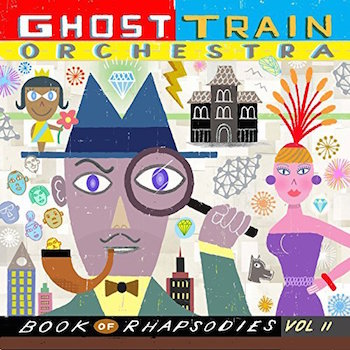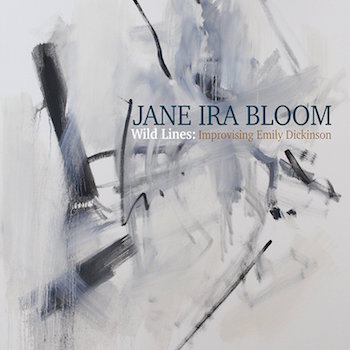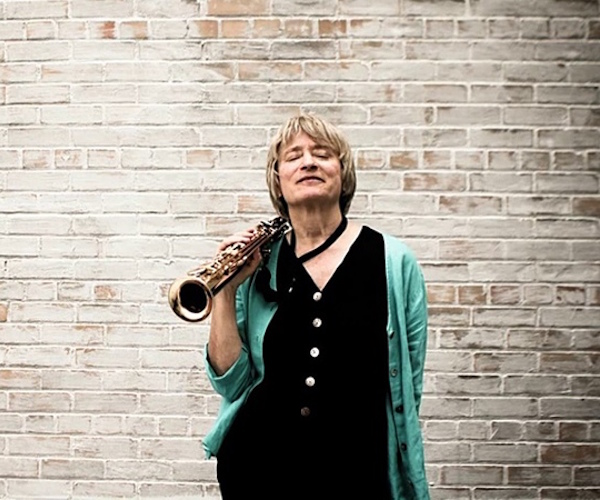CD Reviews: Ghost Train Orchestra’s Book of Rhapsodies, Vol. II” and Jane Ira Bloom’s “Wild Lines: Improvising Emily Dickinson” – Second Thoughts
In two new releases, Jane Ira Bloom and Brian Carpenter complete their work on self-defined projects that are tonics for a time of trouble.
By Steve Elman
Art is sometimes wrongly mocked as escape. Hard-nosed realists would keep us shackled to the practical and force us to admit that any indulgence in beauty for its own sake only puts off the tough work of living. But great art is a doorway rather than a destination. It focuses our attention on the signal and tunes out the noise. It reminds us that that what happens in today’s news cycle should not be mistaken for what is essential. It gives precious perspective.
And it can be fun, too.

In two new releases, Jane Ira Bloom and Brian Carpenter complete their work on self-defined projects that are resolutely uncontemporary, without reference to mass mayhem, nationalist strife, climatic catastrophe, the plight of the displaced, or ill-tempered tweeting. Bloom masterfully documents the final version of her suite of pieces engaging with the words of Emily Dickinson, and Carpenter continues his multi-faceted exploration of an almost-forgotten genre of crossover music. Each of these new CDs is a tonic for a time of trouble.
Carpenter, a trumpeter and arranger with a phenomenal ear, has led the Ghost Train Orchestra for more than ten years, incubating it in Arlington before moving it to Brooklyn. (He has other personae as well, singing and leading Americana ensembles The Confessions and Beat Circus.) Ghost Train Orchestra’s new release (available October 20) returns to music he began to explore in 2011, small-ensemble classical-jazz hybrids from the 1930s and 1940s that edge towards the salon and/or the society boîte. The new CD picks up where Book of Rhapsodies [Vol. I] (Accurate, 2013) left off, exposing more material recorded at the original sessions and adding three pieces from the work of Hal Herzon, an arranger for whom the word “obscure” would be gross understatement.
There is no way to describe this genre simply, or even to characterize generally the styles of the four principal composer-arrangers Carpenter spotlights. If you want a representative sample, go over to Spotify and listen to Carpenter’s arrangements of Alec Wilder’s “Her Old Man Was (at Times) Suspicious” and Raymond Scott’s “Celebration on the Planet Mars,” from the first CD. To make matters more complicated (or more interesting, depending on your point of view), Carpenter is not content to reproduce the original arrangements of the pieces he’s chosen. He refreshes their winking wit by re-orchestrating them for his idiosyncratic little big band and giving solos to Avi Bortnick’s electric guitar, Peter Cancura’s saxophone, Dennis Lichtman’s clarinet, Curtis Hasselring’s trombone, and Mazz Swift’s violin, all of which take the music into the 21st century.
Taken as a whole, the pair of Book of Rhapsodies CDs refashion eight pieces by Wilder, four pieces by Scott, five pieces by Reginald Foresythe, three arrangements by Hal Herzon, three pieces based on classical music, and a ringer by Charlie Shavers. (For the details and a list of the whimsical titles, see More below.)
Each of them is a musical gewgaw, with the elegance and evanescence of a snowflake under a microscope. Is this “serious” music? I discussed this at length in a previous post about Carpenter and his group. Of course it’s serious; no one would go to the trouble to transcribe and perform this complicated material if he weren’t serious about it. But it’s more than OK to smile at the results . . . and you will smile.
If you like what you hear of Carpenter’s work on Spotify and must choose between the two CDs, I recommend the first Book of Rhapsodies over the second. The new one offers fewer opportunities for the players to stretch out, and two of the pieces are shorter than two minutes – “Celebration among a Fleet of Taxicabs” and “Pedigree on a Pomander Walk” call out for the kind of expansion that Carpenter gave to “Celebration on the Planet Mars” on the first CD. And I’m sorry to say that I can’t agree with Carpenter that a children’s chorus has “unmistakable innocence and earnestness,” so I just can’t listen to “Kindergarten Flower Pageant” on Book of Rhapsodies, Vol. II. Maybe you have to be a father to enjoy the discordance. I don’t qualify.
On the upside, the adult vocal chorus Carpenter uses on some of the tunes is more assured in Vol. II than it was in the first outing, and several of the new pieces are well worth hearing repeatedly. I was pleased to discover Foresythe’s “Garden of Weed,” a composition that owes a lot to Ellington’s jungle music without being imitative, as well as his two-part “Hymn to Darkness,” which obliquely illuminates the composer’s African-American heritage. Also, Herzon’s arrangement of Morton Gould’s “Deserted Ballroom” is a real find, with some interesting effects and an appropriate atmosphere. And I shouldn’t forget the cover art, another great example of Noah Woods’s work, this time in color.
 Jane Ira Bloom has been working on the material for “Wild Lines,” her Emily Dickinson suite, since at least July 2015, when she recorded her previous CD, Early Americans (Outline, 2016). Seven originals from that set were incorporated into the first version of the suite, which premiered at Bezanson Hall on the UMass Amherst campus on April 28 last year. (I discussed the CD and the premiere in a previous Fuse post.)
Jane Ira Bloom has been working on the material for “Wild Lines,” her Emily Dickinson suite, since at least July 2015, when she recorded her previous CD, Early Americans (Outline, 2016). Seven originals from that set were incorporated into the first version of the suite, which premiered at Bezanson Hall on the UMass Amherst campus on April 28 last year. (I discussed the CD and the premiere in a previous Fuse post.)
Finally we have a permanent and definitive version of the suite, or perhaps I should say two versions, because Bloom’s new release (Wild Lines: Improvising Emily Dickinson) offers two CDs of the same music. One disk contains the performance as envisioned, with Bloom’s original tunes juxtaposed against recitations of Dickinson’s poetry and prose by the accomplished actress Deborah Rush; the other presents the music without words, in a slightly different sequence.
There’s no cheating here. Different takes of the tunes are used on each disk, which offers a listener the chance to do an A-B comparison of Bloom’s solos and the work of the supporting players from take to take. Although the tune interpretations and the shapes of the solos are consistent on both disks, the words change the music in striking ways.
An example: “Mind Gray River” seems to me to be elegantly processional in feel as an instrumental piece, introduced by stately double-stops from bassist Mark Helias that become the foundation for a passionate and wickedly bluesy solo from Bloom and a gently rocking chorus from pianist Dawn Clement. When the same tune, at the same tempo, becomes the setting for Dickinson’s lines “sequence ravelled out of Reach – / Like Balls – upon a Floor,” the double-stops become the sound of balls rolling back and forth, and Bloom’s solo, though just as bluesy, concludes with trills that suggest the balls again. The tune concludes with deliberate rests between the double-stops, as if the balls roll up one side of a slope, pause briefly, and then roll back in the other direction.
Subtleties like these abound when you make the comparisons, sometimes highlighting how the words “complete” the music, sometimes showing how carefully Bloom has structured the music to allow the words their place.
Bloom made one significant change from her first conception of the suite. The premiere concluded with the swinging, Latinish “Big Bill,” a celebration of Dickinson’s jollier side. Apparently Bloom felt the need for a coda, so she added a few more Dickinson scraps (“Take all away from me, but leave me Ecstasy / And I am richer then . . . It’s a joy to be with you / Because near I love you.”) followed by an a capella version of the Rodgers and Hart tune, “It’s Easy to Remember.” I remember being in the audience for the first performance and feeling a sense of incompleteness at the end of “Big Bill.” In this final version, Bloom sets things right, and this new interpretation of an American popular song is another breathtaking addition to her catalog of songs without words.

Jane Ira Bloom — she has carefully structured the music to allow the words their place. Photo: JChriss&Co.
If you already own Early Americans, consider getting the new CD as well. It opens up a softer side of some of the tunes, and Dawn Clement’s presence, along with her choice of McCoy Tyner-ish modal chording at many points, gives the music a richer sonority. (You will not regret having Early Americans; the razor-sharp acoustic on that set is a definitive setting for Bloom, Helias, and drummer Bobby Previte.) But if you don’t have Early Americans, this new set will provide two hours of pleasure, beautifully crafted and elegantly performed – whether or not you thought you liked Emily Dickinson.
More:
Ghost Train Orchestra’s website shows one upcoming performance, on January 2, 2018, at Dizzy’s Club Coca-Cola in NYC.
Here is the complete repertoire for the two Book of Rhapsodies CDs:
- pieces by Alec Wilder: “Dance Man Buys a Farm”; “It’s Silk, Feel It!”; “The Children Met the Train”; “Her Old Man Was (at Times) Suspicious”; “Walking Home in Spring”; “A Little Girl Grows Up”; “Kindergarten Flower Pageant”; and “The House Detective Registers”
- pieces by Reginald Foresythe: “Volcanic (Eruption for Orchestra)”; “Revolt of the Yes Men”; “Hymn to Darkness,” Parts 1 and 2: “Deep Forest” and “Lament for Congo”; and “Gardens of Weed”
- pieces by Raymond Scott: “At an Arabian House Party”; “The Happy Farmer”; “Celebration on the Planet Mars”; and “Celebration among a Fleet of Taxicabs”
- pieces arranged by Hal Herzon: “Hare and the Hounds” (Philip J. Lang); “Pedigree on a Pomander Walk” (Fabian Andre); and “Deserted Ballroom” (Morton Gould)
- pieces based on classical music: “Charlie’s Prelude” (Louis Singer, based on Chopin), “Fantasy Impromptu” (Evan L. Young, based on Chopin), “Beethoven Riffs On” (Louis Singer, based on Beethoven)
- the ringer: “Dawn on the Desert” (Charlie Shavers)
Brian Carpenter has two upcoming gigs with his band The Confessions, playing what James Reed of the Globe called “Americana by way of David Lynch’s Lost Highway.” They will be at the Lizard Lounge in Cambridge on November 9 and at Drom in NYC on Novermber 10. Both gigs also feature Big Lazy and The Claudettes.
Jane Ira Bloom’s website lists two upcoming performances of Wild Lines, on October 7 at 8 PM and 10 PM, at Kitano in NYC. Allison Miller will be sitting in for Bobby Previte for that gig, but otherwise the personnel will be the same as on the new CD.
Book of Rhapsodies [Vol I], Wild Lines and Early Americans are all hearable via Spotify, but do the artists a favor: if you like the music, buy the darn CDs or pay for streaming them. The three titles above are available through Amazon (along with Ghost Train Orchestra’s Book of Rhapsodies Vol. II, Hot Town, and Hothouse Stomp and many of Bloom’s other releases, including her brilliant Sixteen Sunsets).
Steve Elman’s four decades (and counting) in New England public radio have included ten years as a jazz host in the 1970s, five years as a classical host in the 1980s, a short stint as senior producer of an arts magazine, thirteen years as assistant general manager of WBUR, and currently, on-call status as fill-in classical host on 99.5 WCRB since 2011. He was jazz and popular music editor of The Schwann Record and Tape Guides from 1973 to 1978 and wrote free-lance music and travel pieces for The Boston Globe and The Boston Phoenix from 1988 through 1991.
Tagged: Brian Carpenter, Ghost Train Orchestra, Jane Ira Bloom, Steve Elman
